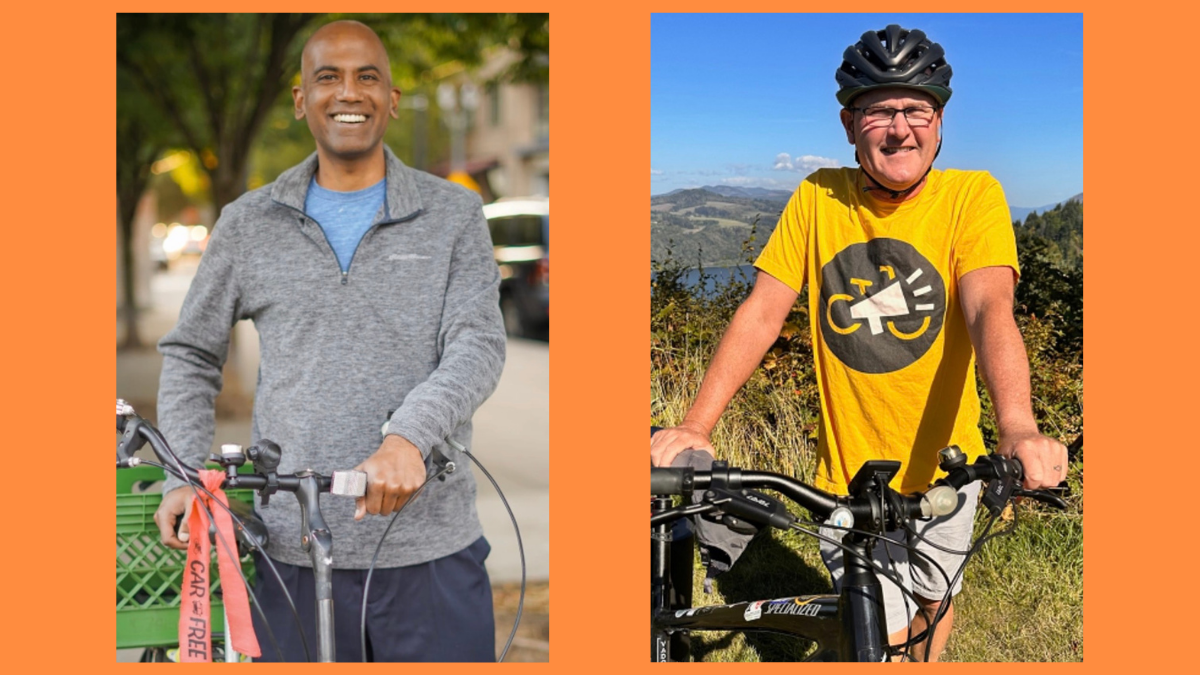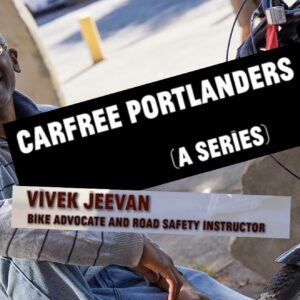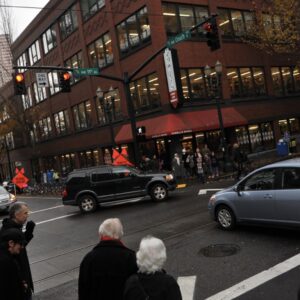
If you think people don’t know how to drive cars safely, imagine the deficit of knowledge and confidence when it comes to bicycling.
The scary truth is that the vast majority of people using our roads don’t know as much about how to operate their vehicles as they should — not to mention the legal requirements of doing so.
Vivek (“Viv”) Jeevan wants to change that. Jeevan, whom you might recall from our video profile or his recent legislative pursuit, is one of Oregon’s pre-eminent road safety educators and researchers. He recently launched a new service for the community that aims to teach people not just how to bike safely; but how to be a safe road user no matter what vehicle you are in.
Portland Bicycle School is Jeevan’s latest passion project. By day, he works with high tech medical devices and trains people how to use them safely. “So it’s easy for me to bring those concepts to traffic education,” he shared with BikePortland via email last week. “This is the bicycle equivalent of Drivers Ed.”
Jeevan is certified as a bicycle instructor with the League of American Bicyclists and veteran cycling advocate whose work with the nonprofit Corvallis Right of Way (now defunct) is widely respected. Local bike advocate and certified instructor Frank Stevens has been trained by Jeevan and has now joined him as an instructor-for-hire.
“Viv’s instruction approach is unique because his course is focused on not only cyclist instruction but also driver education,” Stevens shared with BikePortland. “Pushing back against the misinformation and polarized viewpoints about cycling, while creating a perspective shaped by how fun and energizing biking can be in our local community.”
The two offer a range of services that are flexible to the needs of almost anyone — from folks brand new to cycling, to veterans who want to know the latest laws and tricks to avoid near-misses. The nine-hour class is split between classroom theory and hands-on bike rides with instructors.
The curriculum at Portland Bicycle School pulls from the League of American Bicyclists as well as that of the American Bicycling Education Association — the only two nationally-sanctioned groups that offer bike education.
What sets their courses apart is Jeevan’s integration of car driving best practices and his deep expertise in what causes car/bike collisions. “I’ve likely conducted more studies and written more about the behavioral causes of traffic crashes and fatalities with cyclists and pedestrians than anyone in America,” Jeevan shared with BikePortland (and I realize how that comes off, but Viv is an exceedingly nice and humble guy!).
“Many bike educators out there have never taken a class, never read what causes crashes, never read a law, and never read the Drivers Manual. They don’t know data, theory, and laws. They simply pass along myths they’ve heard,” he continued.
Jeevan scours incident data, police reports and traffic crash analyses to more deeply understand the true root causes of collisions. “We know what are true safety problems and what are myths, so we focus our resources on the top problems,” he says.
Jeevan feels more formal cycling education will save lives and make people better riders and drivers. And to keep things fun, Portland Bicycle School’s offerings complement the Bike Buddy program run by BikeLoud PDX. That program focuses on the need for a social connection to cycling for new riders.
Classes are $60 per hour for individuals (with one-on-one instruction) and $30 per hour for groups. Learn more at PortlandBicycleSchool.com.








Thanks for reading.
BikePortland has served this community with independent community journalism since 2005. We rely on subscriptions from readers like you to survive. Your financial support is vital in keeping this valuable resource alive and well.
Please subscribe today to strengthen and expand our work.
Tangental, but related; do ya’ll call out unsafe bike behavior when you see it? An example that comes to mind is people riding the wrong way in bike lanes. Drivers are barely looking for bikes as it is, let alone someone coming the wrong way. The other day some lyrca guy blew a red bike light on Hawthorne straight into a car (that thankfully saw him and slammed on the brakes) that had a right turn signal phase. I yelled at him as he blew the light and he stopped to cuss me out and tell me I’m “not a real cyclist” – whatever that means lmao.
I can’t help but feel like folks would be more supportive of bikes as transportation if they could trust that the people on those bikes would be safe and predictable.
I don’t call out fellow cyclists/pedestrians unless they are placing me in danger through their actions. A salmon that forces me into traffic is going to get a comment, for example.
The last time that happened I was too busy taking evasive action – any swearing was so far after the fact that only the squirrels heard me.
I don’t call them out at all, even though it does irk me because I am a rule follower and seeing others break rules annoys me in most contexts. My reasoning is that I want all car drivers to be terrified that at any moment a wild cyclist could appear, keeping them constantly on the alert. Most people are way too complacent about the danger of driving so maybe almost hitting these reckless cyclists will shock them into realizing they need to pay more attention. I’m not willing to break the rules or put myself in danger to achieve that, but if others choose to I won’t stop them.
The biggest exception I can think of would be a young kid cycling recklessly, it could just be a lack of proper bike safety education and I don’t want to see a kid get hurt. I‘ve never seen a kid cycling recklessly on the busy urban streets I ride daily though so that’s a non-issue to me.
That’s what I’m talking about though, people almost hit the reckless bike rider and instead of thinking “I should pay more attention/we should build more bike lanes” all they think is “ban bikes”.
Yes, being stuck behind someone on a bike taking the lane and coming to a complete stop at every stop sign famously makes car lobbyists more supportive of bicycle infrastructure lmao
I don’t call out someone on a bike just like I don’t call out people walking unsafe.
Drivers will always hate us regardless.
They mention things like us breaking the law, but really, they are just mad that we are in their way. They are mad they have to slow down for 30 seconds. They think we are less than because we are riding a bike instead pf driving a car.
It’s that simple.
Wait till you see the number of drivers blowing red lights, in cars no less. You’ll be hoarse from all the yelling you’ll have to do.
I try not to get in people’s faces about things in general because I don’t want to get into a literal fight on the street but… let’s be honest here, the only reason crazy bike/ped behavior is more likely to cause a conflict with cars than other bikes and pedestrians is that there are so many cars on the roads.
The bike crash that messed up my shoulder badly enough to need full knock-out surgery was caused by someone running out from behind a parked car without looking. Her lack of caution (to be fair, infrastructure deficiencies didn’t help) had real consequences for me. A similar amount of recklessness and bad luck from a car driver could have hurt me more, I guess, but that doesn’t mean what she did was consequence-free. And also… I see cyclists do stupid, dangerous, and rude things all the time, and sometimes I feel like I don’t want to tell people I had a bike crash because they’ll assume I was doing what they were doing and got what I deserved.
In general I don’t call out any misbehavior of my in-groups because I’m worried about the perceptions of out-groups; I call out my in-groups because the American trend of outsourcing all pro-social accountability to the state means waiting for circumstances to get dysfunctional and dangerous enough that the state is willing to get abusive and violent about it.
Where I grew up, we had, in primary school, a class on driving and cycling on a playground with a mock up of city blocks, traffic lights, stop signs, the works. We’re had pedal cars and kids bikes with trainers. And we were taught how to share the road together. Americans get drivers ED but quickly learn the roads belong to them exclusively. And if they believe in sharing the road, they don’t know how. Both driver and cyclist need to know the rules so everyone is clear on how to share the road.
Car are the problem here, it feels like your blaming cyclists for not known about how car use the road. This is crazy, cars need educating how to be around bikes, not the other way around! Don’t put blocks in the way of people.starting to use bikes
Let’s be real here. Cars aren’t going away anytime soon. Don’t we want people to be responsible, educated and safe cyclists?
I safely and responsbly violate traffic laws to avoid conflict with reckless drivers constantly.
.
The safest way to cross an intersection (without crosstraffic) is often to run the red or use an illegal shortcut (e.g. use a parking lot, crosswalk, or sidewalk to avoid cars). The people locked in their cages hate us not because we violate laws but because we can avoid their “traffic” with ease.
Everybody is a hypocrite at some level.
Ok, but drivers being able to share the road is predicated on the assumption that people on bikes will act predictably and safely.
Safety is truly a shared responsibility, even when one party is behind the wheel of a 2-ton metal death machine and the other party is on a bicycle. How does the saying go? “With great power comes no more responsibility than anyone else.”
I see your point. One use case for this though is some cyclists are afraid to ride with cars because they don’t know how to navigate various situations. I’m thinking back to when I started bike commuting. I had been a cyclist for my whole life, but as an adult that meant taking my bike somewhere in the car. Actually getting in a turn lane for example is something I had never done, and it’s scary.
Obviously (or not) I figured it out and have been a regular commuter / city rider for many years now. But some people (I assume!) never get over that hurdle and don’t have a network of cyclist friends to help them out. Or maybe they do, but they never learned that, say, the Idaho stop is both safe and legal. So this might be a useful way for them to feel comfortable through education. I think it would have helped me.
Alcoholic parents are the problem, not their children. Abusive bosses are the problem, not their employees, Assaulters are the problem, not their victims, etc.
But people realize there’s value in teaching the ones who aren’t the problem how to stay safe around the ones who are.
I should probably say I’m from Amsterdam
I’m from CA, and we had the same thing that Ellie described (little mock-up cities where a five-year-old could practice the rules of the road), at least in the sixties. San Diego, in particular, took two things very seriously: driving and swimming. Really. San Diego State made passing a swimming test a requirement of graduating (at least when my dad went there, a long time ago, don’t know if it’s still in place.)
And the driving. To this day, I can’t run a stop sign. I could be the last human on earth, and I’d still be stopping at stop signs.
Of course, we also had a police presence comparable probably to Singapore—SDPD, Border Patrol, County Sheriff and CHiP. All very present and ready to nail you. Don’t even think about littering.
Wow San Diego sounds like the antithesis of Portland.
Yeah it was, 50 years ago, but it’s not really a fair comparison. I don’t know what Portland was like half a century ago.
The SD Police had their well-publicized problems. My father’s business partner’s niece was murdered by an officer who serially pulled women over in isolated spots to harass them. “Cara’s law” is named after her–that’s the CA law that says you are allowed to drive to a well-lit, populated area before pulling over for a cop.
I went to college on the east coast, which was a culture shock for a lot of reasons. When I returned home for Christmas break (after first semester freshman year) I made the mistake of crossing in a crosswalk on a “Do Not Walk” sign (like everyone did in the New England city I had spend the previous four months). Oh my goodness. I got my first ticket. Not a warning. An expensive ticket.
San Diegans were a nice, friendly bunch, but enforcement didn’t mess around.
What we really need is ongoing drivers’ ed for DRIVERS. Maybe license renewal should require you to past a test to make sure you
stillknow the rules of the road? The other day a driver almost hit me pulling out of a parking garage without stopping or yielding as I walked by on the sidewalk. And then he stopped just long enough to yell at me for not yielding to him! To say nothing of all the honking and swearing I get if I try to cross the street in an unmarked crosswalk.This is what it all boils down to — how to best look out for your own safety and those you encounter.
If you ride in one of the highest concentrations of cars in the western US, simple math dictates that if 99% of drivers are awesome and only 1% bad, you’ll constantly encounter chowderheads.
If you ride like everyone’s trying to kill you but don’t take it personally, you’ll do fine and have plenty of fun.
Vehicular cycling ideology is an indicator of cities with low cycling mode share.
Sure, but still a necessary set of skills even in a city with high cycling mode share.
I ride 4 times a week for fun, ride occasionally for transportation, and own and drive a car. I have been yelled at, honked at, threatened, close passed, tailgated, right hooked, left hooked, and almost run into on my bike and in my car.
I have also had hundreds of people notice me in the bike lane and stop in their lane of travel until I pass. I have also had an accident with a fellow cyclist which I take some blame for.
My family knows I ride a lot, and until recently every time I saw my mom the question was always “Why do cyclists always do (insert action here)?” I finally got tired of the same question and told her that not all cyclists break the law or act like idiots.
I simply asserted that there are a-holes in every form of transportation, because we are all human. I will no longer be a bicycle apologist and will agree that there are issues with everyone from time to time. The main difference being the amount of carnage someone can create based on their mode of transportation.
Then we had a reasonable discussion about how a lot of Portland bicycle infrastructure is over-built, uneccessarily complicated, and confuses cyclists and car drivers simultaneously. If that was your aim – Kudos to you. It’s a big messy process that we all need to work on.
And really with the “lycra guy” trope again? You’re a cyclist no matter what you wear. Be nice, wave to each other on occasion, and be happy for seeing anyone on a bike who is brave enough to ride.